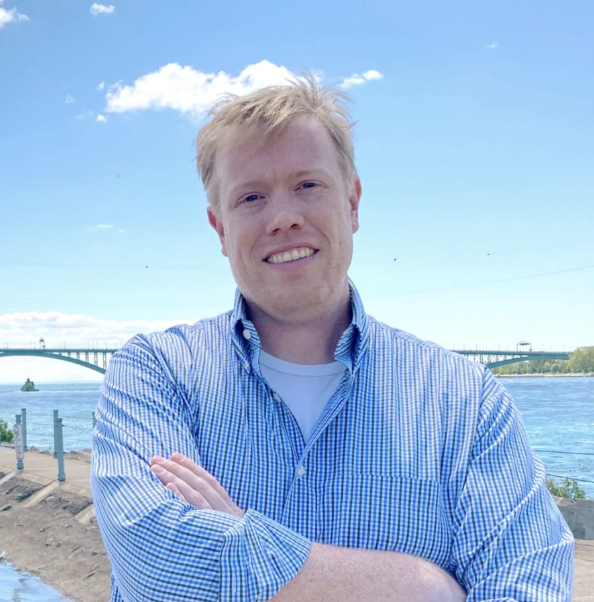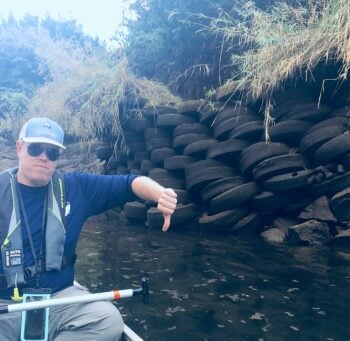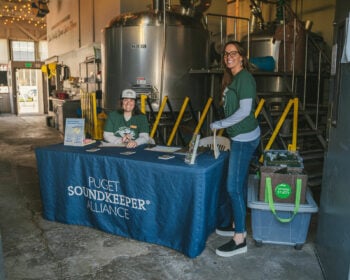Who Is Waterkeeper: Sean Dixon, Puget Soundkeeper
By: Thomas Hynes

Sean Dixon of Puget Soundkeeper grew up on the other side of the country in Buffalo, NY. Obsessed with fish, he learned to scuba dive as a teenager. He enrolled in a high-school version of the Sea Education Association program out of Woods Hole, MA. He interned at the Great Lakes research lab at SUNY Buffalo. He rowed crew, fished, and swam. He did everything he could to spend as much time as humanly possible on the water. Not surprisingly, he studied marine sciences and oceanography in college.
As he embarked on his career, Sean remembered something his mother would tell him: If you want to fix the oceans, you need to learn how they were used. So Sean moved to Alaska and worked as a fisheries observer for a year, spending over 250 days at sea on longliners, pot boats, and trawlers. Sean would then go to graduate school and law school before continuing his remarkable career.
And it truly has been a remarkable career. Sean has been an adjunct professor at Yale College and Pace Law School. He helped launch and run a sustainable seafood company in New York CIty, despite being allergic to seafood. He worked on the Jersey Shore leading cleanups and fighting liquified natural gas facilities. He was a staff attorney at Hudson Riverkeeper. Sean even worked for the U.S. Environmental Protection Agency. 
“My career has never really focused on places that are pristine. I grew up in a Rust Belt town,” says Sean. “The waterways that I’ve always worked in have had a bad rap, but there are people who live there and who fish there and use it for fun and have businesses on the shore. I have lived and worked in places for my whole career that have multiple uses. And I’m trying to find ways to continue those multiple uses that are beneficial and protected.”
It should probably come as no surprise then that Sean made his way next to Seattle, a city known equally for its industrial legacy of shipbuilding as it is for its natural wealth and beauty. Since 2021, he has been the executive director of Puget Soundkeeper, where he works to protect Puget Sound and the Washington waters of the Salish Sea.
“It’s very visceral.This whole place was a fjord formed by glaciers. So every street corner seems to have these water views peeking through. The connection with salmon, the weather patterns here, the greenery, the moisture that we have in our area, the beaches that look out into this massively cool waterway that has the Olympic Mountains on one side and the Cascade Mountains on the other. So you can tell that you’re in this gorgeous valley,” says Sean. “You see sailboats, and cargo ships, and kayakers, and orcas, and seals. You know we have the world’s largest octopus living probably 500 feet off the coast of Seattle. It’s amazing. It’s an ever present thing you feel, see, and can’t help but smell.”
Puget Sound is also known for its iconic wildlife, especially the salmon. As scenic and beautiful as the waters are, they still face a ton of threats. Toxic stormwater is a big problem. An industrialized landscape, full of bulkheads and devoid of much vegetation, also makes things difficult for salmon populations. However, an emerging threat is beginning to worry the folks at Puget Soundkeeper.
It’s called 6PPD, and it was used to make almost every tire on the road for decades. When tires shed on the road and mix with oxygen, it creates 6PPDQ, which gets carried away with stormwater (apparently it rains some in Seattle) and can be extremely toxic to fish. In fact, it is believed to be the second-most toxic chemical for aquatic species known to science. The dangers of 6PPD and 6PPDQ have become more mainstream lately thanks in large part to Puget Soundkeeper being in the vanguard of this issue for years.
 Puget Soundkeeper has been doing this kind of great work for four decades. The organization was founded in 1984 in response to the fact that Seattle didn’t have any secondary treatment infrastructure for wastewater.
Puget Soundkeeper has been doing this kind of great work for four decades. The organization was founded in 1984 in response to the fact that Seattle didn’t have any secondary treatment infrastructure for wastewater.
“Everyone thought it was too costly to do and that the Sound could handle it,” says Sean. “So Puget Soundkeeper was founded as an alliance of dozens of groups that came together to say with one voice that we need actual sewage plant upgrades. From there, the work kept progressing and building. Plastic waste reduction, stormwater control, and restoration of historic sites like the Duwamish River and Harbor Islands.”
Just to be clear, that’s not all Puget Soundkeeper has accomplished over the years. They launched a clean marina program. They got a no discharge zone for sewage from boats. They have brought over 200 lawsuits against polluters. They have led cleanup efforts at Lake Union every July 5th clean up after the city’s fireworks show. They got restaurants to use compostable clamshells for to-go orders. They are a Founding Member of the Waterkeeper Alliance. And that’s just a few examples.
To his credit, he is quick to point out that he does not do this work alone. There is a team of nearly a dozen professionals on staff and the organization’s Board; some are transplants to the area like Sean and others are locals who have been working at or with Soundkeeper for decades. One is Anna Bachman who founded Waterkeepers Iraq-Kurdistan. Together they make Puget Soundkeeper what it is.
Or as Sean puts it, “We are all Soundkeepers here.”